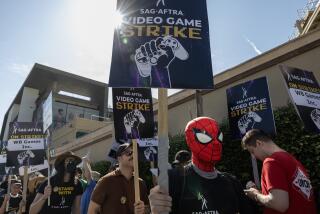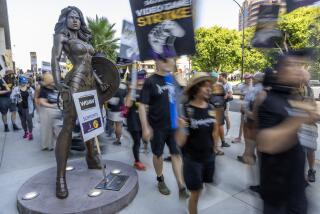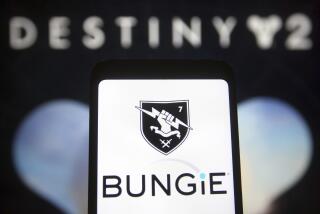Activision reaches settlement with co-creators of ‘Call of Duty’
One day before trial was set to begin in a trio of lawsuits with claims totaling more than $2 billion, video game publisher Activision Blizzard Inc. reached a settlement with the co-creators of the “Call of Duty” series and 40 developers who worked on the games.
The last-minute agreement Thursday ended two years of litigation during which nasty accusations flew back and forth and Santa Monica-based Activision endured the embarrassing disclosure of private contracts and a plot, code-named Project Icebreaker, to secretly monitor developers’ email and voice mails.
The dispute began in March of 2010 when Activision fired Jason West and Vincent Zampella, who headed the Infinity Ward studio that produced the original “Call of Duty” in 2003 and many of its sequels. The pair immediately sued their former employer, claiming that it wrongfully terminated them to avoid paying hundreds of millions of dollars in royalties and bonuses.
Activision countersued, accusing the developers of breaching their contracts by trying to decamp to rival Electronic Arts Inc., and calling them “insubordinate and self-serving schemers.”
After West’s and Zampella’s departure, more than 40 game developers who had worked for them at Encino-based Infinity Ward quit to follow their former bosses. Forty filed a separate lawsuit against Activision, alleging that the company deprived them of hundreds of millions of dollars in bonus payments and royalties.
Total damages alleged by all the game makers totaled more than $2 billion, according to Activision court documents. The game company never detailed its financial claims.
Terms of the agreement were not disclosed.
“All parties have reached a settlement in the dispute, the terms of which are strictly confidential,” said Robert Schwartz, an attorney representing West and Zampella.
West declined to comment but smiled broadly as he left the hearing. The game maker, who typically appears at industry events in shorts and a T-shirt, regularly attended court hearings wearing a suit without a tie, his hair tied into a ponytail.
Many in the video game industry have been riveted by the conflict, which pitted the nation’s largest game company against a group of respected developers. Some game makers saw it as a case for artists’ rights in an industry where even the most successful creators don’t enjoy the same superstar status of directors such as Steven Spielberg.
Investors, meanwhile, were watching closely how far Activision would go to assert control over its most valuable franchise, which has generated nearly $7 billion in global sales revenue over eight games.
“This legal battle is the most significant in video game history,” said Evan Wilson, an analyst at Pacific Crest Securities. “It’s been a major distraction for senior management at Activision at a time when the industry is going through one of its most difficult periods.”
Unsealed documents revealed that West and Zampella were feuding with Activision senior management as far back as 2009. In his deposition, the company’s chief public policy officer, George Rose, said of the game designers: “They’ve gotten into increasing series of altercations.... They refused to take orders.... They had completely separated themselves from the rest of the company to the point where not even members of Activision management were allowed on the premises.”
Rose asked an information technology staffer to access West and Zampella’s emails, voice mails and computer files that summer as part of an initiative code-named Project Icebreaker. When that proved impossible, the company considered staging a fake fire drill or fumigation in order to access Infinity Ward’s offices, according to testimony by the IT staffer, George Fenady.
In addition, Activision’s confidential contracts with West and Zampella, as well as Bungie Studios, creators of the hit “Halo” games, were disclosed in court filings.
“Activision was getting a tremendous amount of pressure in the press,” said Stephen Smith, an attorney at Greenberg Glusker Fields Claman & Machtinger in Los Angeles. “They were getting hammered by all the documents that were coming out.”
While the parties involved in the settlement agreed not to speak publicly beyond carefully vetted statements, Electronic Arts stepped up to paint the agreement as a victory for West and Zampella. The Redwood Shores, Calif., company, which settled its own litigation with Activision last month, is funding the former “Call of Duty” developers’ next game.
“Activision’s refusal to pay their talent and attempt to blame EA were absurd,” a spokesman said. “This settlement is a vindication of Vince and Jason, and the right of creative artists to collect the rewards due for their hard work.”
In a statement, Activision said it did not expect to disclose the amount of the settlement to its investors because it would not have a material effect on its earnings during the quarter. Analyst Evan Wilson of Pacific Crest Securities said the amount probably would be more than covered by profits from “Diablo III,” a game Activision released last month.
Michael Pachter, an analyst at Wedbush Morgan Securities, estimated that Activision ended up settling for about $140 million, including $42 million that it paid last month to the 40 former Infinity Ward developers.
Activision’s stock fell 17 cents to $11.74 before the settlement was announced.
More to Read
Inside the business of entertainment
The Wide Shot brings you news, analysis and insights on everything from streaming wars to production — and what it all means for the future.
You may occasionally receive promotional content from the Los Angeles Times.










